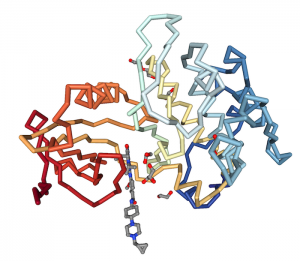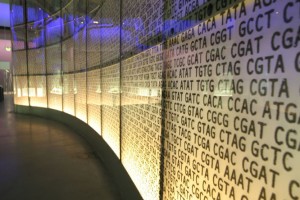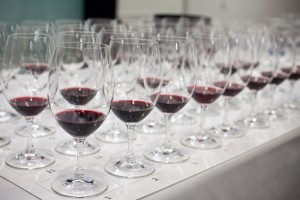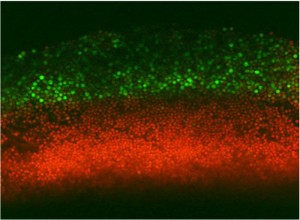Enter your address to receive notifications about new posts to your email.
Articles tagged Yeast
(40 results)
-
Beyond stressed-out: the hypoxic response
Deep within a tumor, sequestered from an adequate blood supply, a cancer cell grows and multiplies. Far beneath Earth’s surface, a microbe lives and thrives in similarly low-oxygen conditions. Generally, oxygen depletion causes serious distress to aerobic organisms—what allows these life forms to survive? The cellular response to hypoxia is massive. Hypoxia alters the expression…
-
Cold-loving fungi fight frostbite, but can’t take the heat
To the unaided eye, Antarctic soil and alpine glaciers may appear to be barren wastelands devoid of life. But some microbes call hostile habitats like these home. Research on one such organism, published in the latest issue of G3, reveals some of the mechanisms behind cold adaptation—and explains why these otherwise hardy creatures can’t survive…
-
Using yeast to expose cancer’s genetic vulnerabilities
Cancer profoundly scars the genome of an affected cell. Amplification and overexpression of chunks of DNA sequence are common—but it’s not always clear whether these changes are directly involved in the disease or byproducts of some other malfunction. Further complicating the search for treatments, many genes that are altered in cancer cells are involved in…
-
How studying bakers’ yeast unlocked the secrets of our body’s recycling plants
In the late 1980s, Japanese biologist Yoshimori Ohsumi finally got to run a lab of his own and began casting around for a suitable topic to occupy himself and his new grad students. At 43 years old, he did not consider himself much of a scientific success; he was now hoping to corner a niche of biology…
-
Behind the podium: TAGC Keynote Speaker Jef Boeke
“This is the first self-replicating species that we’ve had on the planet whose parent is a computer. Because it’s very difficult to eliminate multiple genes from a cell . . . we decided early on that we had to take a synthetic route—even though nobody had been there before—to see if we could synthesize the…
-
Model Organism Databases join forces: Announcing the Alliance of Genome Resources
Model Organism Databases (MODs) and the Gene Ontology Consortium play a crucial “behind-the-scenes” role in the work of model organism geneticists and many other biomedical researchers. This guest post by the newly-formed Alliance of Genome Resources announces the group’s intention to integrate the efforts of the MODs and other genome resources. You can learn more…
-
Runaway amplification: 800 copies and counting
Massive amplification of genes is a desperate strategy taken by stressed populations adapting to an environment that has become inhospitable. Such amplifications can give an underperforming gene a much-needed boost in productivity simply by increasing its copy number. But counterintuitively, research reported in the May issue of G3 implies these amplifications may arise even in…
-
Wine yeast genomes lack diversity
Sequencing the genomes of hundreds of strains of the wine yeast S. cerevisiae has revealed little genetic diversity and high levels of inbreeding. In many cases, yeast strains sold by different companies were almost genetically identical. The results, published in the April issue of G3: Genes|Genomes|Genetics, suggest that winemakers attempting to develop improved wine yeasts…
-
New Faculty Profile: Mike Downey
New Faculty Profiles showcase GSA members who are establishing their first independent labs. If you’d like to be considered for a profile, please complete this form on the GSA website. Mike Downey Assistant Professor (Since November 2014) Department of Cellular and Molecular Medicine University of Ottawa Lab website Twitter: @DowneyUOttawa Research program: Our lab studies protein…
-
Structure in yeast colonies
Compared to a human, a tree, or a jellyfish, the single-celled yeast might seem like a loner. Multicellular organisms like plants and animals are complex co-operative structures made of many specialized cell types, while a single yeast cell can survive and proliferate without the help of others. But although you might think of yeast as…
-
New Faculty Profile: Peter Stirling
New Faculty Profiles showcase GSA members who are establishing their first independent labs. If you’d like to be considered for a profile, please complete this form on the GSA website. Peter Stirling Scientist, Terry Fox Laboratories Assistant Professor University of British Columbia Lab website Research program: My lab is using functional genomics, molecular biology,…



![By 23am.com (Antarctica Sailing Trip) [CC BY 2.0], via Wikimedia Commons.](https://s43361.pcdn.co/wp-content/uploads/2016/11/rsz_1antarctica_sailing_trip_pct283253678755pct29-300x201.jpg)








